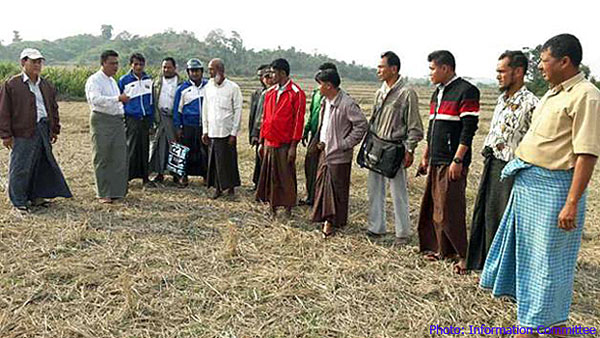Yangon ,February 7 (Radio Free Asia) More than 800 Rohingya Muslims have left Myanmar’s volatile Rakhine state for neighboring Bangladesh in the past week, while others continue to cross the border daily, authorities in Buthidaung township said Monday.
In total, nearly 700,000 Rohingya have fled Rakhine’s three northern townships of Buthidaung, Maungdaw, and Rathedaung since a military crackdown targeting them began in August 2017.
Buthidaung township administrator Kyaw Min Tun told RFA’s Myanmar Service that the government and other organizations have provided support to the remaining Rohingya to get them to stay.
“Actually, the government, civil society organizations, and the U.N.’s refugee agency have provided support to them for their survival, and they also can work on farms and in the fishing business because the situation in the region is getting calm,” he said.
Kyaw Min Tun also said Rohingya residents from Rathedaung, which has the smallest number of Rohingya of the three townships, are crossing the border as well.
“Most people from Rathedaung are going to Bangladesh,” he said. “They are going there for their own reasons, such as to join relatives already in Bangladesh, and they asked them to leave Rakhine state or else they have threatened to move out.”
Myint Kyaing, permanent secretary of Myanmar’s Ministry of Labor, Immigration and Population, said the government has been trying to give the Rohingya what they need so that those still living in northern Rakhine will remain.
“[But] we can do nothing when they go to Bangladesh, even though we try to stop them, because it is their right to decide where they want to live,” he said.
About 850 people from 12 villages in Buthidaung township arrived at Dawdu Tharya Creek to go to Bangladesh on Jan. 28, Myanmar’s Information Ministry said in an announcement.
Some Rohingya who escaped the crackdown have accused Myanmar forces of conducting a brutal campaign, including killings, rapes, torture and arson, in their communities. The U.N. and the United States have said that the atrocities amount to ethnic cleansing.
The Myanmar government has denied the reports and blocked both a U.N. commission of investigators and the media from independently investigating refugees’ claims.
Myanmar and Bangladesh signed an agreement in November 2017 for the voluntary repatriation of the Rohingya with returns slated to begin in January. But delays in compiling and verifying the list of people to be sent back has held up the process, and it remains uncertain whether significant numbers are willing to return.
Zeid Ra’ad Al Hussein, the U.N.’s high commissioner for human rights, said during a speech in Jakarta on Monday that possible acts of “genocide and ethnic cleansing” against the Rohingya could spark a religious-based conflict that spreads beyond Myanmar’s borders, Agence France-Presse reported.
“Myanmar faces a very serious crisis with a potentially severe impact on the security of the region,” he was quoted as saying.
“It is sometimes said that today’s human rights violations will become tomorrow’s conflicts,” he said. “If the Rohingya crisis were to spark a broader conflict based on religious identities, the ensuing disputes could be a cause for great alarm.”
Rakhine state to sue AP
Zeid’s remarks came on the heels of the publication of an Associated Press report saying the news agency had confirmed the existence of more than five previously unreported mass graves in Buthidaung township’s Gu Dar Pyin village through interviews of survivors in refugee camps in and time-stamped cellphone videos.
Myanmar’s government rejected the report, denying that there were five mass graves of Rohingya in the village, and saying that 19 terrorists had been killed and buried in the area.
The Rakhine state government said on Monday that it will sue the Associated Press for what it called a false report, though it has yet to announce under which laws it will file the case.
“We are going to sue the AP,” said Maung Maung, secretary of Rakhine state’s Information Committee. “We investigated the situation as AP said and found nothing. We have to find out what charges are applicable in order to sue it.”
Government authorities said that a commission consisting of the Buthidaung township administrator, a police officer, a legal officer, a doctor, and an immigration officer went to the five places AP mentioned, but had found nothing.
Village heads and residents also said that no such incident as the AP reported had occurred in their village.
Meanwhile, the Myanmar government is committed to not using the term “Rohingya,” Thein Swe, Myanmar’s minister of labor, immigration, and population told lawmakers on Monday in the capital Naypyidaw.
He made the comment in response to a question from opposition lawmaker Tin Aye of the Union Solidarity Development Party (USDP) about the use of the term, which is not recognized by the Myanmar government.
The government refers to the Rohingya as “Bengalis,” because they are considered illegal immigrants from Bangladesh. As such, they are excluded from Myanmar’s official list of 135 ethnic groups, and thereby are prevented from becoming citizens.
Thein Swe also said that the Myanmar government has repeatedly told the media that there is no Rohingya ethnicity in Myanmar and that the term cannot be used in any speech or official message.
Myanmar embassy officials around the world and Myanmar diplomats at the United Nations do not use the term, he said.
But Thein Swe told reporters after the parliamentary meeting that the media can now use whichever term they want.
“We have been working for all interests for the nation [and] ethnic groups in the long term with a broad perspective and corrected actions,” he said. “We have responded with proper consideration and wisdom according to rules and regulations instead of responding emotionally.”
(The featured image at the top is that of a mass grave site in Bathiadaung in Rakhine State, Myanmar)
(Story Courtesy Feedspot)





























































